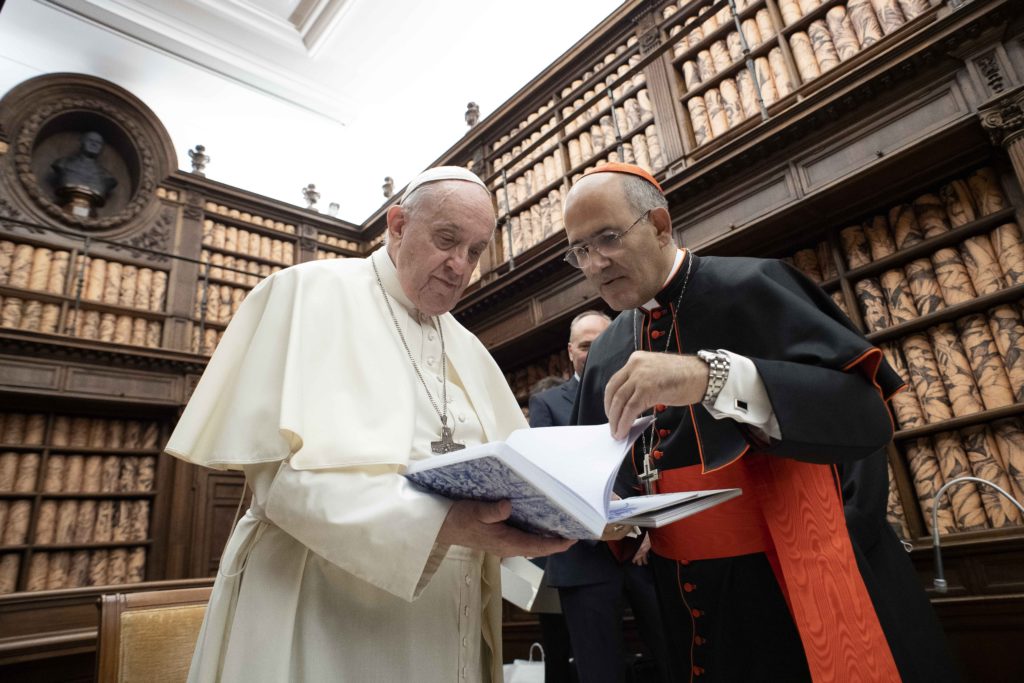ROME — As the old saying goes, “Beware of Greeks bearing gifts.” One might very well say the same thing about popes, because sometimes their presents, however well-intentioned, are actually burdens in disguise.
Perhaps the latest case in point was Pope Francis’ Sept. 26 appointment of Portuguese Cardinal José Tolentino de Mendonça as head of the brand-new Dicastery for Culture and Education, which combines the former Congregation for Catholic Education and the Pontifical Council for Culture. It’s the first nomination after the pope’s sweeping reform of the Roman Curia contained in the document “Praedicate Evangelium” (“Preach the Gospel”), which took effect in June.
In one sense, it’s a deep honor for the 56-year-old cardinal, who effectively replaces Italian Cardinal Gianfranco Ravasi as the Vatican’s point man for the engagement of culture. Cardinal Ravasi, who’ll turn 80 on Oct. 18, is widely regarded as perhaps the smartest man in the Vatican after Pope Benedict XVI.
To step into those shoes, therefore, means the pope thinks Cardinal Tolentino, an accomplished poet and essayist whose former job was as the Vatican archivist and librarian, has some serious intellectual chops.
On the other hand, it also means Cardinal Tolentino now inherits one of the most complicated gigs the Vatican has to offer, because, let’s face it, an institution that notoriously thinks in centuries isn’t always well-suited to adapt to the lightning pace of cultural change in the 21st century.
Let’s consider just three of the cultural trajectories Cardinal Tolentino will have to face.
Metaverse jurisdiction
Without getting our inner geek on too much, the term “metaverse” refers to digital environments in which people can assume new identities, interact with other users, build communities, advocate causes, engage in commerce, and generally construct a sort of virtual civilization.
More and more, much of what counts as social life is being conducted in these virtual spaces.
Historically speaking, the emergence of civilization has been accompanied by the development of law, although law usually follows conquest. That’s certainly a point of which the Vatican is well aware, since it’s the major heir of law originally developed in ancient Rome.
At the moment, the only real “law” in the metaverse is that imposed by the major corporate entities that dominate the space, such as Facebook, Microsoft, Epic Games, and Apple — and, of course, there’s no guarantee whatsoever that their standards will be in the public interest.
As cultural activity shifts to the metaverse, the question arises about the need for a social contract. For instance, should white-owned commercial interests be able to create black avatars to become virtual influencers driving minority communities to their products? If not, who, exactly, has the authority to say such behavior is out of bounds?
Such questions raise a thorny intersection of legal, moral, political, technological, and cultural headaches, and one doesn’t envy Cardinal Tolentino having to noddle through it all.
Creator Inequality
The emergence of what’s called the “creator economy,” meaning individuals rather than corporations or major media organizations creating content that other people pay to consume, is without a doubt among the megatrends of our times.
Platforms such as YouTube, Instagram, and Twitch have given individuals the chance to reach mass audiences, and it’s working. By 2018, Twitch’s aggregate viewership actually had surpassed that of established news networks such as CNN. It’s estimated some 50 million people around the world now consider themselves “creators,” which is greater than the total population of, say, Spain or Argentina.
Yet data also suggests a dramatic inequality in the creator economy. On Twitch, for instance, one percent of streamers earn half the total revenue. Among podcasts, the top 1% receive a staggering 99% of downloads. Moreover, data also show that minority creators are paid less than their white counterparts, even with similar levels of usage.
In effect, the creator economy is replicating the inequalities of the pre-existing order, and, if anything, exacerbating them.
Promoting greater equity in this fast-evolving space, therefore, is another daunting challenge.
Neuroeducation
The emerging field of educational neuroscience carries the potential to revolutionize education by making it possible to tailor instructional strategies to the particular neurological characteristics of particular learners.
Over the last 10 years, the number of online searches for the key word “neuroeducation” have shot up 405%, according to ExplodingTopics.com, which is one sure gauge of rapidly increasing interest.
Among other things, neuroscience appears to be showing that most people do not learn best by rote memorization or listening to presentations, but by experimenting, getting involved, and practicing with their hands. Key principles include brain plasticity, mirror neurons, emotional triggers, and multisensory learning.
The same science also suggests that learners can’t all demonstrate their mastery in the same way, suggesting the need for nontraditional testing.
At one level, this is a practical challenge for Catholic education to keep pace with the best of emerging secular expertise, which will have to be overseen and supported by the new dicastery Cardinal Tolentino leads.
At another, there’s also an issue of equity here, since the Catholic institutions best positioned to take advantage of the results of neuroscience — and, for that matter, to pay for it — are the ones in the affluent West. Promoting partnerships and collaboration across global boundaries, therefore, will be another key challenge.
In other words, Cardinal Tolentino seems to have his work cut out for him. His new gig still may be an honor, but it’s hardly a sinecure.

